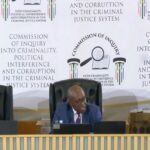-
Minister of Correctional Services, Dr Pieter Groenewald
The Minister of Correctional Services Dr. Pieter Groenewald, says challenges of overcrowding, the presence of crime syndicates and gangs within correctional facilities remains, despite the department’s efforts to tackle it.
The minister says these issues are ongoing, whilst also increasing at the same time.
Groenewald highlighted this while tabling the department’s budget vote for the current financial year in Parliament.
“These challenges can compromise issues such as overcrowding, dilapidated infrastructure, a rising number of remand detainees, deteriorating facilities, staff shortages, the presence of crime syndicates and gangs within our institutions, and emerging crime patterns that pose challenges to our rehabilitation process.”
He adds that the budget cuts impact negatively on the security of correctional facilities.
“The budget constraints have to do with R29 billion for 2025, R30 billion for 2026-27 and R371,9 billion for the 27/28 financial year. Those constraints and cuts have severe effects on these matters, which actually are operational matters and compromise the department of correctional services when it comes to security. We will have to do more with less. This will require innovation, discipline and commitment especially from the employees of the correctional services.”
— The Department Correctional Services 🇿🇦 (@DCS_ZA) July 1, 2025
Groenewald says he will be very strict when approving paroles for the inmates, who were sentenced to life in prison.
“Upon assuming office I have inherited 495 lifer profiles-a backlog. Now only the minister can approve or not approve paroles for lifers. I am very strict when it comes to that and I want to put it on record that again it does not matter whether an applicant has gone to the courses and rehabilitation programmes through our facilities. When I receive a psychological report or criminalist report and the risk of re-offending is medium to high, I will not approve any parole for that specific person.”
The minister confirmed that over the past few years a number of prohibited objects including cell phone devices were confiscated in the majority of the country’s correctional facilities.
“Since July 2024, many cell phones and sharp objects have been recovered. In the last year 515 officials received final written warnings. 181 were suspended without pay and 146 were dismissed.”
Deputy Minister, Lindiwe Ntshalintshali said they are working to upskill offenders as part of the rehabilitation so they can be employed after serving their sentences.
“The drive is to have all our training sites receive full accreditation through partnership with the manufacturing, engineering and related services sector education and training, quality council for trades and occupation and even global technology conglomerates. We are creating skills training opportunities in welding, textile, technology amongst many others. These initiatives aimed at preparing inmates for employability, dignity and contribution post-incarceration.”







